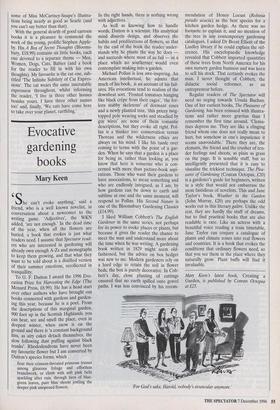Evocative gardening books
Mary Keen
She can't evoke anything,' said a friend, who is a well known novelist, in conversation about a newcomer to the writing game. 'Adjectives', the WKN added, 'are not enough.' In the dead time of the year, when all the flowers are buried, a book that evokes is just what readers need. I assume that Spectator read- ers who are interested in gardening will already own enough A-Zs and monographs to keep them growing, and that what they want to be told about is a distilled version of their summer emotions, recollected in tranquillity. To G. F. Dutton I award the 1996 Evo- cation Prize for Harvesting the Edge (The Menard Press, £8.99). He has a head start over other authors who have brought out books connected with gardens and garden- ing this year, because he is a poet. From the descriptions of this marginal garden, 900 foot up in the Scottish Highlands, you can hear, see and smell the place, even in deepest winter, when snow is on the ground and there is 'a constant background hiss, as airy cakes detach themselves, the slow following dust puffing against black trunks'. Rhododendrons have never been my favourite flower but I am converted by Dutton's species forms, which
float their crimson-throated primrose trusses among glaucous foliage and effortless branchwork, or climb with soft pink bells sparkling after rain, through tiers of blue- green leaves, pure blue shoots jostling the deeper pink unopened flowers.
In the right hands, there is nothing wrong with adjectives.
As well as knowing how to handle words, Dutton is a scientist. His analytical mind dissects design, and observes the habits and predilections of flowers, so that by the end of the book the reader under- stands why he plants the way he does — and succeeds where most of us fail — in a place which no southerner would even contemplate making into a garden.
Michael Pollan is less awe-inspiring. An American intellectual, he admits that much of his book, is an account of his fail- ures. His evocations tend to realism of the downbeat sort. 'Frosted tomatoes hanging like black crepe from their cages', 'the for- lorn stubby skeletons' of dormant roses and a newly planted tree, 'this pricey twig- topped pole wearing socks and steadied by guy wires' are none of them romantic descriptions, but they evoke all right. Pol- lan is a thinker too: conservation versus Thoreau and the wilderness ethics are always on his mind. I like his tussle over coming to terms with the point of a gar- den. When he says that a garden is a place for being in, rather than looking at, you know that here is someone who is con- cerned with more than picture-book aspi- rations. Those who want their gardens to have associations, to mean something and who are endlessly intrigued, as I am, by how gardens can be down to earth and sublime at one and the same moment, will respond to Pollan. His Second Nature is one of the Bloomsbury Gardening Classics (£14.99).
I liked William Cobbett's The English Gardener in the same series, not perhaps for its power to evoke places or plants, but because it gives the reader the chance to meet the man and understand more about the time when he was writing. A gardening book written in 1829 might seem old- fashioned, but the advice on box hedges was new to me. Modern gardeners rely on a hard edge to retain the soil in flower beds, the box is purely decorative. In Cob- bett's day, close planting of cuttings ensured that no earth spilled onto gravel paths. I was less convinced by his recom- mendation of Honey Locust (Robinia pseudo acacia) as the best species for a kitchen garden hedge. As there was no footnote to explain it, and no mention of the tree in any contemporary gardening catalogues, I asked Dr Brent Elliott of the Lindley library if he could explain the ref- erence. His encyclopaedic knowledge revealed that Cobbett imported quantities of these trees from North America for his own nursery garden business and was keen to sell his stock. That certainly evokes the man. I never thought of Cobbett, the didactic social reformer, as an entrepreneur before.
Regular readers of The Spectator will need no urging towards Ursula Buchan. One of her earliest books, The Pleasures of Gardening has been reissued with illustra- tions and rather more gravitas than I remember the first time around. 'Clema- tises depress me. They are like a clinging friend whom one does not really mean to hurt, but somehow in one's impatience it seems unavoidable.' There they are, the clematis, the friend and the crusher of ten- der feelings and shoots, as plain as grass on the page. It is sensible stuff, but so intelligently presented that it is easy to visualise the trickiest technique. The Plea- sures of Gardening (Conran Octopus, £20) is a gardener's guide for beginners, written in a style that would not embarrass the most fastidious of novelists. This and Jane Taylor's book, Weather in the Garden (John Murray, £20) are perhaps the odd works out in this literary galere. Unlike the rest, they are hardly the stuff of dreams, but to find practical books that are also readable is rare. Like an actress with a beautiful voice reading a train timetable, Jane Taylor can conjure a catalogue of plants and climate zones into real flowers and countries. It is a book that evokes the conditions that ordinary flowers need, so that you see them in the place where they naturally grow. Plant buffs will find it invaluable.
Maly Keen's latest book, Creating a Garden, is published by Conran Octopus at £25.
'For God's sake, Harold, nobody's avuncular anymore.'


















































































 Previous page
Previous page